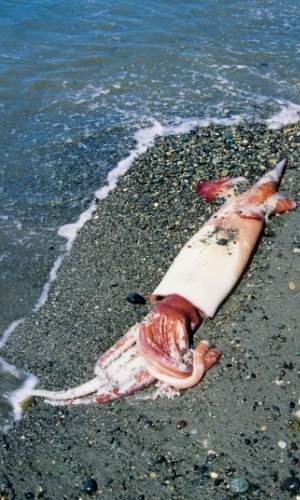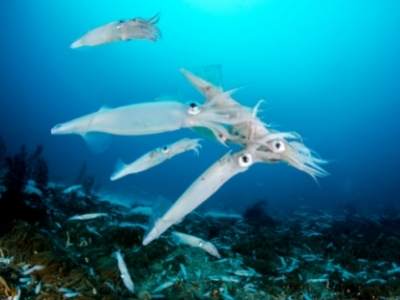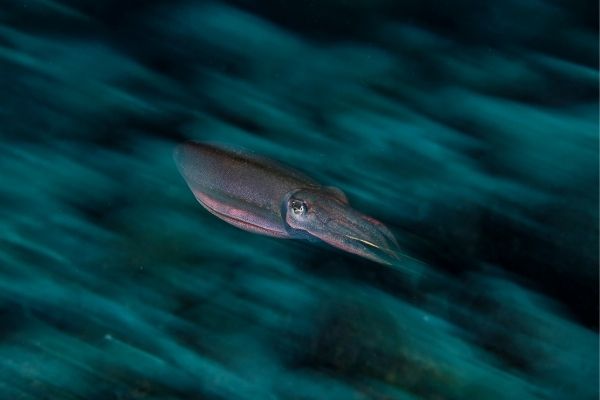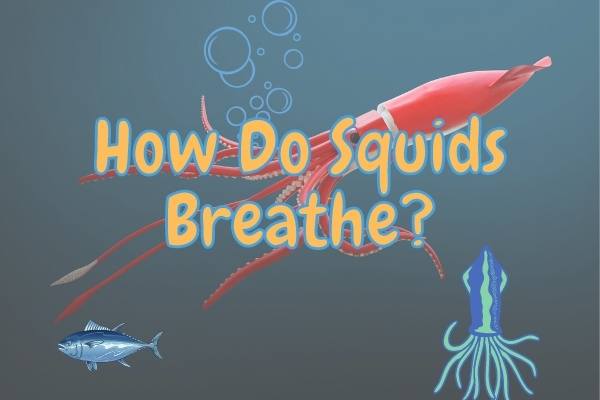Squids are deep-sea animals. They spend their whole life underwater and are not able to survive on land. This is primarily because they cannot breathe (or walk!) on land.
Squids use gills to breathe like fish and other sea creatures. It is the most common way for water-breathing creatures to get oxygen from the water they live in. The gills of squids have tiny muscular moving flaps that transfer oxygen into their bodies, which then travel to their organs through their bloodstreams.
Gills are also used by other cephalopods such as octopuses to breathe underwater. But unlike some crabs with gills that also work on land, the gills of squids are optimized to breathe underwater, and cannot be used effectively on land.
That means they won’t be able to live on dry land for very long. They can, however, stay for a limited length of time in a humid environment.
Is it Possible for Squids to Breathe on Land?
No. Squids may survive on land for several minutes in optimal conditions, but they cannot breathe effectively on land.
Squids gills cannot obtain oxygen on land. Gills will collapse on land, which reduced the surface area to a level where little to no oxygen is absorbed.
This is unlike crabs, crayfish and lobsters that can actually breathe for hours on land as long as their gills are wet.

Squids have three hearts that they use to transport the oxygenated blood around their bodies. Two of them are dedicated to transporting blood to the animal’s gills, underlining the animal’s oxygen supply reliance on its gill and the importance of constant blood flow to the gills.
The organs’ circulation is maintained by the third heart. When the squid swims, this organ’s heart stops beating, explaining why the species prefers to float rather than swim.
Their heart system subsequently circulates blood throughout the squid’s body, keeping it alive. On the posterior side of the mantle, you can see their outflow (siphon) over their eyes (opposite the pointy side).
Do Squids Breathe Underwater?
Yes, but they use their gills instead of lungs.
Fish, squid, and other sea creatures require oxygen to breathe via their gills in the same way that people require oxygen to breathe through their lungs.
All living things need oxygen to survive. Oxygen can be found in the air and water. To avoid drowning, water organisms must filter the oxygen out of the water and then discard it.
An octopus or squid breathes through its gills in the same way that all other fish do. The gills of a squid is positioned inside the mantle cavity and escape to the outside.

The oxygen requirements of the giant squid are higher than those of other mollusks and fish. Squids have three hearts, two of which pump blood across the two gills, which are responsible for oxygen exchange.
To perform cellular respiration, squids require oxygen. They will die if they go on land because they do not have adequate oxygen since they are unable to breathe and make energy.
How long can squids survive out of the water?
Not for long, maximum 40 min. in humid conditions and less if the surface and air are dry.
Squids need water to breathe; therefore the land crawl is not only inconvenient but also dangerous.
Passive diffusion allows for a limited degree of gas exchange when their skin is damp. Because some oxygen is also absorbed through the skin, the squid may remain on land for brief periods of time.
Squid species, including the Humboldt squid and the Caribbean reef squid that reside in intertidal seas or near the beach, are known to crawl out of the water for brief periods of time.
However, because most squid species are nocturnal, we don’t see them very often. Although their boneless bodies appear inadequate for migrating out of the water, it is hypothesized that they are motivated by food, such as shellfish and snails found in tidal pools.

Some coastal squids are thought to be able to crawl on land for at least several minutes in damp coastal environments if they mostly hop from pool to pool, never staying out of the water for long.
However, this has not been fully elucidated and they will not last long if exposed to a dry surface in the sun.
Why do squids require water in order to breathe?
Because squids have gills instead of lungs, they must rely on water to exchange oxygen and carbon dioxide.
Squids live in the ocean and do not come to the surface for oxygen; therefore they must obtain it through their gills. Gills are used by all fish, by lobsters, octopi, and squids.
The lack of buoyancy causes gills to collapse on land, which reduced the surface area to a level where little to no oxygen is absorbed and carbon dioxide cannot be released (which leads to dangerous acidification of the squid’s blood).
The gills work similarly to our lungs in that they take oxygen from the air we breathe. So we breathe air into our lungs, and this air contains some oxygen.
These oxygen molecules are delivered into our circulatory system (heart, arteries, and veins) when they come into contact with our lung surface, allowing all of our organs to receive oxygen and stay alive.
The water of the ocean works the same way for gills as the air works for our lungs. However, lungs are designed for air and gills for water, so they will not work outside their preferred medium.
Is it possible for squids to drown?
Yes! A squid will drown if the oxygen level of the water is too low, or other gases (like carbon monoxide) prevent their gills from absorbing enough oxygen.
However, it takes much less oxygen for a squid to survive compared to other sea creatures like crabs or octopuses.
Dissolved oxygen, or DO is the most important measure of water’s ability to sustain aerobic life. It is a measure of the oxygen that is present in water.
A high DO is required for aquatic animals to breathe. Aquatic populations will move away, fail to reproduce, and diminish or perish if DO levels in lakes, rivers, and ponds fall too low.
In the ocean oxygen levels rarely drop to critical levels unless there are local algae blooms or massive decomposition of organic matter (microorganism uses up the oxygen).
However, squids are fairly well adapted to low oxygen levels as they typically live in the deep sea where the DO is lower than at the surface.
More interested in the fascinating lives of squids? Take a look at my latest posts on what other animals eat squids and about how squids defend themselves against predators!




